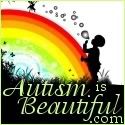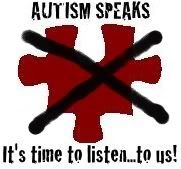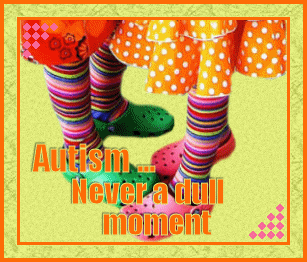I wasn't going to write about this. But, the more I have thought about it, I really wanted to share. Every once in a while, I second guess myself. This is in all areas of my life, my relationships, my children. This is not exclusive to autism, or the paths we've chosen regarding autism. At any rate, I found myself wondering if I was doing any good. I contemplated quitting blogging and just moving on.
I'm a free spirit at heart, and truly hate to see parents on different "sides" of the autism debate fighting. So much time, energy, and emotion is wasted, and our focus is lost. Isn't this about our wonderful, amazing children? Can't we find some common ground? I so often just want to scream "can't we all just get along??" I do not hate anyone, I may have distaste for others' views, yes. However, I do not hate them just for their opinions, despite how misled and inaccurate I may feel those are. I do not wish these other parents any harm or misery. I also don't necessarily feel that one is a bad parent or terrible person for venting about their life or about autism (when it is done in a respectful and non-degrading, mature way).
I don't instantly think someone is horrible if they are trying biomedical "treatments" for their child. It does make me sad, I have concern for both the child and their family. It's heartbreaking to me hearing many of these parents speak toward autism, and worst, their own child. I always look to see the other side, their perspective. I haven't walked a mile in their shoes, perhaps I have no clue. So, I am sympathetic (to a point), and often try to keep my mind and heart open. I believe I am not in the position to truly judge anyone. At the core of it all, I seem many similarities between myself and say, Jenny McCarthy. We are, after all, simply two moms with autistic children, doing what we feel is right for our kids.
With all that said, I also have my eyes wide open, and see very clearly what is going on around me. I see how autistic adults are mistreated, disrespected, discriminated, and misrepresented in society. I see the abuses that autistic children and teens have endured. Sadly, I know of far too many autistic people, of all ages, who have been murdered. This is reality. This is what is happening now, today. This is why I write. This is why I will continue to fight.
Dozens of purported autism charities and groups collect millions upon millions of dollars. Year after year, where does this money go? Have we seen a sharp increase in the last few years of services for autistic adults? Are families with young children being helped or supported any more than they were five years ago? Are schools that much better equipped to handle the needs of students along the autism spectrum? Is the public truly more "aware," prepared, or better accepting of autistics? Where I live, and from others I speak to all over the U.S., the answer is a sad and resounding NO.
Until I can say that yes, true change is happening and I am hopeful for my child's future and the future of all autistics, I will keep advocating. I am hopeful for my child's own future, it is her future in society that I am concerned about. I worry about her education, her vocational prospects, living arrangements, and overall quality of life as she reaches into adulthood. What kind of world will be there for her? It's certainly not the world that is out there right now. I'll be damned if I don't make real, positive change, so that she is able to continue flourishing and making the most of her strengths in her teen and adult years. My legacy for her will be that she is accepted, and truly appreciated, by the public. I will work tirelessly for this.
Speaking of tirelessly...sometimes this (fighting for change) feels like a heavy burden. I hit one of those points late last week. I wondered if I really was changing things for my child. Was there much point to all I was doing? I stumbled onto some very negative writings, and honestly felt hopeless about so much. How can I really convince people, so full of contempt and vile, that they're wasting all their energy and time on the wrong things? Fight for our children, not against them. Rally for their rights, battle for acceptance so that our children will have a real place in society. I was contemplating a lot. One of which was to just quit typing, and let it all go. Sometimes, the arguments that go on between us parents all are so very tiring to me.
I took the long way to get to my point, but here it finally comes. Each time I reach a moment like this, I am reminded in some way of why I write, and why my voice is important. I want to thank Katie McCarron's grandfather, Mike. He wrote an open letter to the Autism Hub, of which I am proudly and graciously a member of. His letter came at just the time I needed to hear those words. I, like all the other hub members, were moved beyond words by his message. He has inspired me, and really put any doubts I may have had to rest. I have printed out Mr. McCarron's letter, and it hangs by my desk. It will be there, everyday, along with my daughter's picture, reminding me not only why I do it, but why it is vital I continue.
Thank you, again, Mr. McCarron, for your inspiring and encouraging words.
1/29/08
Thank you, Mike McCarron
1/28/08
Why Does It Bother Me?
What's the big fuss if you are working to "eliminate" Autism? What's wrong if you say you're committed to eradicating it, for future generations? Why is it hurtful (and disturbing) when you promise to "prevent and cure anything along the Autism spectrum"? How come the terms "war on Autism," "Cure Autism Now," "Defeat Autism Now!" and others are downright frightening to people like me? Why does seeing celebrities peddling diets, supplements, and other "cures" for autism disturb me? Is it anything other than brave, for a mom to openly admit she's contemplated taking her autistic child's life? Is it really wrong to routinely preach that autism devastates families, destroys marriages, and puts most into severe debt?
What, really, is the harm in any of this?
From the Peoria Star Journal:
Numerous witnesses said Karen McCarron, a former pathologist, couldn't accept Katie's autism and was obsessed with finding a cure.When a cure couldn't be found and suggestions of institutionalizing the girl and giving her up for adoption were rejected by family members, she chose to kill her.
Katie was sent to a special school for children with autism in North Carolina, where she lived with her father for nearly two years. Karen McCarron pursued various types of therapies and hired caregivers to work with her daughter as the obsession with curing the autism grew.
We all know what happened next. Sadly, Katie's story makes my point all too well. The current view society has of autistics is that they really don't count. Millions of dollars are spent each year by researchers working to find a cure and by parents willing to try anything to "rid" their child of autism. So, what else is society to think? Their views of autism are coming from typically one source, those views are very negative. The public must wonder how anyone, any family, could ever live with autism.
As much as we prefer to not think about it, murders (and attempts) like this happened before and continue to happen. This is something that cannot be ignored, will not be ignored. The organizations, politicians, and anyone else who fills the airwaves with hateful and hurtful depictions of autism will no longer go unchecked. Our voices are larger and louder than ever before.
So, the next time someone asks you about curing autism or about Autism Speaks or about the article they read in the paper--perhaps tell them about Katie. Tell them the beautiful words Katie's grandfather has shared with us. Tell them about your own child, or any of our children. Tell them how our kids are just that, kids. Yes, they are autistic, they are beautiful, they are human, they are here with us, and they are so full of life. Let them know why promoting the idea that autism is dreadful, and that autistics are not really human, let them know how very hurtful and dangerous that is.
1/25/08
Jenny Is Back On Her Typewriter...
...Someone PLEASE stop her!!
Well, with the holidays & all, I have just now gotten back to checking out TACA and all those other websites I love so much (sarcasm, in case you missed it!). Well, I missed quite a morsel here!! It seems that Jenny McCarthy (yes, the one who is unsure if any adult autistics exist...the one that has her "PhD" from Google...the one who practically guarantees that autism can be "recovered," that one) is once again writing a book. This one, I presume, will be an all-out tell-all about how to "recover" or "cure" your child. It will, it seems, feature bunches and bunches of pictures of "recovered" children, or kiddos "in recovery."
This, of course, leads me to at least 100 questions. Like, what is recovery? What does "recovered" look like? Who decides which child is actually recovered? That's just the tip of the iceberg. I also then wonder, since these pictures are just sent in with a simple label of "recovered" or "in recovery," who can really verify any truth behind the pictures? Very curious, indeed. Very irresponsible, indeed. Yes, Jenny and TACA, what a very big impact it will make, to have page after page of "recovered' children, placed strategically in a book all about how to recover your child, and, I guess, "success" stories of recovery.
The pictures, the stories, the half-truths, the lies...will only add to the current disparagements about autism. For one, it will do absolutely nothing to help a single autistic adult. It will not improve the educational or career opportunities for autistics. It will not change society's view of autism, nor will it prevent further discrimination of autistic individuals, and it won't help ensure that every autistic person is afforded human rights. No, at best, it will lead to parents wiping out their bank accounts on snake oil and further TACA's agenda (and fatten their wallet). At worst, it will again further stigmatize autism, lead to more discrimination and defiling of autistic people. Even scarier, a book such as this could lead parents to stop at nothing to "recover" their child. We have seen what can happen when parents see autism as something to be stomped out, and become obsessed with a cure.
Here is the information from TACA's website:
Jenny McCarthy Seeks Photos
of All Children Affected by Autism
Remember the impact of seeing the stack of photos of recovered and in the process of recovery from Larry King Live? It's time to do that again – this time in book form.
...........
Jenny McCarthy is looking for photos of children for her upcoming book on
recovered kids and kids in process of recovery. This includes all children on the autism spectrum that their families wish to participate.
It is my sincere hope that this book doesn't make it to print. Most especially if it is at all reminiscent of Ms. McCarthy's media blitz. The whole "I recovered my son from this dreadful thing that trapped him inside himself" with a bit of "you are only a good mother if your child can make the same amount of progress as mine," finished with a touch of "we shouldn't let autistic children grow up to be autistic adults." I'm fairly certain that no matter what efforts are made, it will still be published. But, I feel I must at the least let the publishers & author know my concerns. With any luck, the book will include at least one big disclaimer. Like this: DIETS, SUPPLEMENTS, OR ANY OTHER SUPPOSED "CURE" IN THIS BOOK WILL NOT WORK FOR EVERYONE; MANY CHILDREN HAVE TRIED SUCH THINGS, AND IT HAD ZERO EFFECT; WE DO NOT RECOMMEND BLOWING THROUGH YOUR LIFE SAVINGS FOR ANY OF THESE "TREATMENTS;" AUTISM IS NOT SOMETHING TO THINK OF WITH HATRED AND DISGUST, IT IS AND ALWAYS WILL BE A PART OF YOUR CHILD; MOST IMPORTANTLY, LOVE AND ACCEPT YOUR CHILD..." I'm sure I could think of a chapter's worth of disclaimers.
At any rate, I am off to start writing letters now. It is my right to let my voice be heard. This is something I am passionate about, and truly worried about. I don't know how any of us can really look at Katie McCarron's picture to the right, and not be fearful of the possible ramifications of this. Should you care to join me, here is some contact info:
The publisher is Dutton, a division/subsidiary of Penguin Group (USA) Inc. Of course, Jenny McCarthy is the author. The email, fax, & address associated with the pictures to be sent (& a possible point of contact here) in are as follows:
recoveredkids@gmail.com
FAX 310-826-8020
Ashley Davis
11812 San Vicente Blvd Suite 604
Los Angeles, CA 90049
Lastly, here is TACA's contact information:
TACA
P.O. Box 12409
Newport Beach, CA 92658-2409
Phone # 949-640-4401
Fax (949) 640-4424
You can google their website, if you want additional information on TACA or on this project.
1/23/08
Update on CAICA
 Big sigh of relief...
Big sigh of relief...
I have heard from CAICA (Coalition Against Institutionalized Child Abuse), and I can assure you that they did not approve of the writings from the "Hating Autism" blog. They were removed immediately, once it was brought to their attention. I was so glad to hear this, as that type of writing did seem very opposite to what they fight for. I am very relieved that the hateful writings were not intentionally added there, and how quickly they acted on this. BRAVO to CAICA!!
Also, should you ever see anything like this on CAICA in the future, please feel free to email them at info@caica.org so they can investigate them. If you are unsure what CAICA is about, please visit their website.
1/22/08
My Autism Everyday: The Vast Reality of Waiting Rooms
 Sitting in a doctor's waiting room can be difficult for any child. A child who has anxiety, sensory issues, and generally dislikes the medical community (too many pokes!), it can be a really unbearable time. We overcome this by packing up some toys, a drink, and by simply hoping the wait isn't too long. Sometimes my daughter likes to be held, or rocked, or bounced. Other times, she just wants to sit by herself. We had to make an unexpected trip to the doctor's office last night. Thank goodness for evening hours, as emergency rooms are, by far, the worst of the worst sensory assaults.
Sitting in a doctor's waiting room can be difficult for any child. A child who has anxiety, sensory issues, and generally dislikes the medical community (too many pokes!), it can be a really unbearable time. We overcome this by packing up some toys, a drink, and by simply hoping the wait isn't too long. Sometimes my daughter likes to be held, or rocked, or bounced. Other times, she just wants to sit by herself. We had to make an unexpected trip to the doctor's office last night. Thank goodness for evening hours, as emergency rooms are, by far, the worst of the worst sensory assaults.
It was a great relief when we walked into the office, and my daughter didn't start crying. She seemed okay with it. Greater relief came when I saw Toy Story 2 playing on the TV, and that the waiting room was empty. We sat there, watching the movie. She was next to me, curled up. Then she sat on my lap. We rocked, side to side and then back and forth. Little by little, more people walked into the office. Little girls, little boys, lots of sniffles. No one was being called in, the clock passed time away. A woman and her son walked into the waiting room, they had already been seen. A minute or so passed, and I realized this boy was autistic. He was making very loud vocalizations, flapping his arm up and down, and fidgeting with his pockets. He was coughing too.
The mom and I smiled at one another. Her son was very cute. I realized she didn't speak much English, so I didn't attempt any conversation. As the minutes passed by, and our wait was prolonged, I observed this mother and son. I smiled when I saw him caressing and playing with her hair, the same way my daughter often does to mine. Each time the boy coughed, the mom lovingly rubbed his back. At one point, he put his arm around his mom. When he became agitated, either because of the wait, or because he didn't feel good, or simply because he was child, his mom placed him in her lap. They too rocked and snuggled.
So, there it was. My daughter and I, rocking, snuggling, smiling. This mother and her son, rocking, snuggling, smiling. Autism and all...rocking, snuggling, and smiling.
Granted, this whole scenario could have gone rather differently. We have had plenty of those waiting room moments. But I find it increasingly important to let the world know that the reality of our lives include these peaceful, very typical moments. I am not unique. The other families I know are not unique. Our vast reality with autism is not at all that different than anyone else's journey. Once parents recognize, and society sees, the similarities between themselves and autistic individuals, only then can real change occur. Simply see your fellow human being as just that: human. From that point, and only that point, move forward and then do something for and with the autistic community.
1/17/08
Dedicated to Katie McCarron
Please click here to read those dear words from Katie's Grandfather, Mike McCarron. Thank you.
This entry is for Katie, and her family. My heart goes out to the McCarron family, and you are in my prayers. To her father, grandfather, and grandmother--there are simply no words to express the sorrow my heart carries for you. The pictures and words you have shared of Katie, she reminds me so much of my own daughter. I imagine they'd enjoyed one another's company. I am grateful for the loving words you have shared with the world. You, in your darkest hour, have step forth not only to stand up for your dear Katie, but also to speak up for all our children. I am forever thankful.
Peace be with you.
Warm Summer Sun
Warm summer sun, shine kindly here;
Warm southern wind, blow softly here;
Green sod above, lie light, lie light;
Good night, dear heart, good night, good night.
- Mark Twain
More written for Katie:
Dear Katie
http://www.kevinleitch.co.uk
http://ballastexistenz.autistic
This will be my last entry until a verdict comes in...
Update: Guilty on all charges, read more.
From the Peoria Journal Star:
"If the measure of a person's life could be quantified by the number of people that loved them, then Katie, in her brief 3½ years, achieved well beyond all of us," Paul McCarron said in a prepared statement about his daughter after the trial.Kevin Johnson, chief assistant Tazewell County state's attorney, said he told Paul McCarron and family the trial would be a long and difficult process.
"Today we reached the end of that journey with a justified verdict," Johnson said.
Paul McCarron stood next to prosecutors after the trial and thanked them and police for their work.
"We are blessed to have these caring and professional people in our community," he wrote.
The sentencing range for first-degree murder is between 20 and 60 years, but because Katie was younger than 12 years old, that sentencing range increases to between 60 and 100 years.
A sentencing date was not set Thursday but is expected to be scheduled today.
"I ask all parents, and especially those of children with disabilities, to always love your children and be proud of them," Paul McCarron wrote in his statement. "Cherish every moment you have with them. Love, patience and tender efforts are the best therapies."
(bold & enlarged text added by S.L.)
Thank you Katie's father, Paul McCarron for those beautiful words. It is my greatest hope that every parent and family who learns about Katie will take your message to heart, and live it each and everyday.
1/16/08
What Autism Speaks Chooses To Report On...
From the most recent newsletter from our friends at Autism Speaks:
IAN Reports on Treatment Methods Used by Parents
A new finding from the Interactive Autism Network (IAN) indicates that children who are registered in the database with autism spectrum disorder are receiving, on average, five simultaneous treatments for autism. This preliminary data on treatments was issued today by IAN, a project collecting information online from families of children with ASDs throughout the United States.
I have several issues with this, both the email and the project. When I first saw that the newsletter was featuring a story from IAN, I wondered if they would ever make their recent poll to autistic adults a feature story?
Yes
9%
No
80%
I'd wait and see what happened to others
6%
Don't know
"IAN is a web project of the Kennedy Krieger Institute sponsored by Autism Speaks."
Let's NEVER forget this, when we are looking at anything IAN-related.
IAN Research Findings: Treatment Data
The Interactive Autism Network (IAN), a project collecting information online from families of children with autism spectrum disorders (ASDs) from throughout the United States, reports on treatments. How many autism treatments are families using at once, and what do these tend to be? What are the most popular treatments? The IAN Project hopes the collective experience of individual families can guide research priorities.
Autism Treatments: The Great Experiment
Dozens, if not hundreds, of autism treatments are currently in use. In many cases, there is little or no scientific evidence to support their effectiveness. Parents of children with ASD, driven to help their children and knowing time is of the essence, are unable to wait for answers. They find themselves making all sorts of choices and trying all sorts of remedies, often in the absence of adequate information.
I've never looked at my child, or any other autistic person as an experiment. I've never thought of a certain therapy, medication, etc. as an "experiment." The use of the word "experiment" again makes us look at autism as something scary. You envision a mad scientist doing evil "experiments" in his dark and spooky lab. That's not my life, not my experience.
They admit there's little to NO scientific evidence to support their effectiveness. No one ever dives into this fact, it's something that's simply mentioned here and there. Nothing that important. Well, if I "had" a diagnosis, with which didn't affect my physical health, and certainly wasn't fatal, I wouldn't hop on the bus to try "questionable" treatments. Now, our child takes medication for seizures and G.I. problems--all of which have been studied a ton by real scientists and doctors. That is different, I'm not talking about the conditions that can occur along with autism. I am talking about just the autism itself. I would never allow my child to be a guinea pig, not for autism. If she had a fatal disease, I would, most likely, try any treatment available--even a controversial one! That is a completely different topic here.
Why is "time of the essence?" Why can't we "wait for answers?" There again, they ensue panic. I've spoken to so many parents who look at their child as a ticking time-bomb. "If I don't get intervention or answers or whatever by the time he's 3, it's all over!" That is how so many parents have been told to look at autism. God forbid your child be diagnosed at age 4 or 5, well, it's too late then. Give up on him! This again, is propaganda. Does it appear that the earlier one is diagnosed, loved, and accepted (okay I added those, firm believer here!), they will ultimately do better? Yes, but by no means does it mean you should give up on any child, at any age, because of autism.
In the absence of adequate information: yes, this pretty much sums up all that Autism Speaks, TACA, mercury & biomed folks, do everything. Would we accept that type of uncertainty if we were speaking about a different group of people? If this discussion was regarding deaf or blind persons, would parents make such thoughtless, abrupt decisions? Would anyone, any charity, support this type of careless and rash behavior by people in the medical community?
So many parents have gone through this: researching, agonizing, choosing, evaluating, dropping treatments, adding treatments … trying to find a combination that keeps their child stable, healthy, present, and able to learn and grow. Most would agree that going through this process is a nightmare.
Agonizing...
Nightmare...
Agonizing Nightmare = Autism?
Is that how they really see things? That is sure how it comes off. And, to think, this is not even an ad, a "documentary," or other publication asking you for money. No, this is Autism Speaks and IAN, supposedly reporting on one of their research projects. I'm confused also, about parents "agonizing" and trying to keep their child "stable, healthy, present." As far as autism goes, the terms "stable" and "healthy" have very little involvement. Stability, if you are speaking in terms of psychiatric issues that may be comorbid to one person's autism, is different. But, they make no mention of that. Are they talking about an autistic child who also has bipolar? Yes, there is a need to stabilize this child--but in terms of autism, overall, stabilizing someone just doesn't make sense. It is, again, a fearful word--stabilize is what they do in emergency rooms, during tragedies, etc.
Most autistic people and children I know are relatively healthy. Yes, some have immune-related issues, but again, that is not the autism. Not every autistic has autoimmune issues. So, if you are speaking in generalizations, most autistics are healthy and would not require any medication (above or beyond the average population) to remain healthy. And then, there's the use of the word "present." This is most offensive, and most concerning. If your child is in front of you, aren't they "present?" The word again, leads us to assume, that an autistic person is either always or at least some of the time, not really present or with us. This gives distance between us and them, this makes them again closer to inhuman or something completely different. They are not present. They should not be counted.
"...this process is a nightmare." For who? My life is not a nightmare. Most autistic adults will tell you, the only nightmare they deal with is when they have been institutionalized, put on improper medication, abused, bullied, treated like aliens, disregarded, denied human or civil rights, etc. There is no need to go through this "process" or to "agonize" over it, and feel like you are living a "nightmare." Accept your child, accept that autism is an essential part of your child. Your child cannot be separated from their autism. Love your child, unconditionally. Realize, your child is human, and is present always. Then go forth, and discover what works for your child, what makes them comfortable, be creative, be kind, and be loving.
Parents need answers. Too many have participated, unwillingly, in the great autism treatment experiment.
This last sentence sends chills down my spine. I have a child. I love my child. Anything involving my child, is not done unwillingly. I haven't been forced into parenting. Therefore, anything regarding my child, is simply a part of my life. I may not like it all, but I would never tell people I was forced into this unwillingly. This type of statement is akin to the idea that autism holds a family hostage or has kidnapped your child. More propaganda, more falsehoods.
The average number of simultaneous treatments that children with ASD participating in IAN receive is five, although more than half receive four or fewer. (See Figure 1.) About 5% of children currently receive no treatment at all, while others receive dozens. (The child with the most concurrent treatments is on 56!)
So, after all the fear-mongering in the above paragraphs, they finally present the "startling" information regarding these "treatments." I was expecting to read all about chelation, B12 injections, supplements, etc. But, no, these "treatments" that parents "agonize" over, this "nightmare experiment" that these families are talking about are very basic therapies. In fact, most of the so-called treatments are helpful tools and well-accepted therapies. When I first read this, my first thought was "ugh, I would never make this list!" Well, come to find out now, my daughter has had a lot of these "treatments." I just never looked at it from this point of view. They are simply things that doctors had advised or suggested, and most have been very helpful for my daughter. Here is the list:
Figure 1.
The most common treatments used by IAN families are listed in Table 1. These treatments, taken all together, account for more than 50% of the treatments that families list.
Table 1. Top Individual Treatments Used by IAN Families
Rank Treatment
1 Speech and Language Therapy
2 Occupational Therapy (OT)
3 Applied Behavioral Analysis (ABA)
4 Social Skills Groups
5 Picture Exchange Communication System (PECS)
6 Sensory Integration Therapy
7 Visual Schedules
8 Physical Therapy (PT)
9 Social Stories
10 Casein-free Diet
11 Gluten-free Diet
12 Weighted Blanket or Vest
13 Risperdal
14 Melatonin
15 Probiotics
My child has been in speech therapy since before her first birthday. Back then, it was mostly to help with oral motor dysfunction and feeding difficulties. It's continued, still for those reasons, but also to help with communication now as well. It's all been a positive experience, and she has fun with her speech therapist. My daughter calls her her friend and likes "playing" with her.
My daughter has also been in (& out) of OT from early on, this has helped with her fine motor skills delays and feeding difficulties. We have never sought out an OT who deals solely with autism. We have found, and prefer, therapists who work with a wide variety of patients. For some reason, it seems to us they have better perspective, and a better view of the "big picture." They also don't seem to be attached to stereotypes, or to be selling us on biomed cures.
No ABA for us. For one, we had a brief "encounter" with a milder style, if you will, of ABA. Basically, entice or bribe child into doing something, child screams, blow bubbles or give other such reward. We quickly ended this, a we saw little improvement and felt it was simply wrong! We then read up more on "real" ABA, and were really sickened.
No social groups here, yet, either. Now, we do bring our child to parties, friend's houses, etc. So, you could call those "social skills training," just like every other child partakes in. Yes, my daughter often has difficulty with outing, there are meltdowns, she may opt to remain by herself, but we deal with it. If we have to leave early, so be it. We read social stories, sometimes even make up our own, and these have helped over time. We also make sure we give our daughter plenty of warning prior to the outing, pack her special bag with her favorite things and snacks. We don't force her to be a social butterfly.
We have used and still use PECS. I would never think of this as a "treatment," but more of a helpful tool. Our daughter has PECS picture books, schedule, choice boards, etc. She is verbal, but the visual reminders are helpful, and some days, she prefers using the cards. I think PECS are fabulous and should be encouraged.
Sensory Integration Therapy, again, yes, we use this "treatment" and have since early on. Our daughter was diagnosed with Sensory Processing Disorder at around 10 months old (it was quite obvious and severe). So, sensory integration is more of a part of our life. We see an OT regularly, more for ideas on making our daughter more comfortable with certain situations, etc. This has been so key, and has helped our child feel safer with bath time, grooming, bedtime, etc. We have a lot of "sensory" items in our home, both our kids use them, as they are a lot of fun. They have extremely therapeutic benefits, and help our child immensely.
Our daughter started PT while still in her infancy, as she has always had hypotonia and delayed gross motor skills. She goes in and out of PT, depending on how her strength and stamina are. Again, I can't say it enough--all of her therapies have been done in a very positive, child-led way. For the first couple of months, the PT never even touched my child. She would scream and be upset, so the PT would guide me along each visit, teaching me what exercises to do. As my child became more comfortable, felt safe, and started to have fun in her therapies, she would lead the session. She was able to choose what toys to play with, etc. Her therapists keyed into what our child liked, they'd pick out those toys or borrow them from others, and present them to her at the start of a session. It was and always is fun. The minute my child seems upset or scared, they stop. We hug her, comfort her, etc. If she can't settle down, the session is over. There is no forcing or dog-training going on. All of her therapies were focused on helping our daughter become stronger and feel more comfortable, not make her "normal" or appear to "like all the other kids."
We have never done a special diet. My child does have some dietary restrictions, these are for documented medical reasons.
My child has a weighted blanket, again, this is something I would recommend. I don't necessarily consider this a "treatment" though. Our daughter's blanket is adorable, I will post a link here sometime to the company we ordered it from. This has helped her go to sleep, and sleep longer.
At this point, the medications my child is on are related to physical medical issues.
Our other child is on Melatonin, though...she is not autistic. She has major sleep issues, literally cannot sleep. Melatonin has helped her a lot. I don't consider this a "treatment," simply a natural sleep aid. Again, that my non-autistic child uses!
Probiotics are great, and for a family with GI issues, they have been very helpful. So, again, not an autism treatment to us. Simply something that has helped our physical health issues.
So, let's see...if I was a part of this study, my autistic child has had 7 or more "treatments," and just for good measure, my non-autistic child has had at least 2 "treatments." I think they hype this study up, far too much. Most autistic children I know have never needed all the therapies my child has needed. Again, a lot of her therapies were most likely needed to help with non-autism diagnoses. And, a lot of their "treatments" are better described as "tools to help" And, most of them are far from being autism-specific.
So, what really can one conclude from this information? Very little, when you look at the big picture. If you look at "treatments" and therapies that children with other developmental delays or disabilities use, you would not see much difference. One could then conclude that the difference between having an autistic child compared to a child with any other developmental disability may not really exist. One could most likely draw more similarities than anything else. So, is every parent, raising a child with a developmental disability, in agony? Are they all part of an evil experiment? Are they all living a nightmare? Interesting enough, I've never heard this type of language used with regard to Down Syndrome, Cerebral Palsy, Rett Syndrome, Angelman Syndrome, etc. I wonder then, where is the line that makes life with autism in it, that much dire?
Shame On The Media (again)
A verdict is due any moment in the trial of Karen McCarron, the mother who viciously suffocated her 3 year old daughter to death. Her daughter, Katie McCarron was a beautiful, precious, and happy little girl, she was also autistic. The media coverage has been sparse, and this story has gotten very little national attention. Thus far, every article or story I have read or seen leaves out a very crucial image--a picture of Katie. Most have no pictures, others show only Karen McCarron.
I have found, also, that most stories use lines and words like "...little girl was asphyxiated..." and "smothered," all take away from the fact that a mother murdered her child--held a plastic bag over her face for at least two minutes. The stories also include lines like this, telling us how much Karen McCarron suffered and how she "longed for a life without autism..." Where is all the outrage in the media? What advocacy groups are standing up for Katie?
The overall theme is that autism was to blame for a mother killing her own child. Karen has pleaded not guilty by reason of insanity. This woman was so insane, or so her attorney claims, that she drove her child to her parents' house, where she knew no one was home. She killed her, then drove Katie's lifeless body home. She carried her upstairs, passing by others in the home, pretending that Katie was sleeping. She then ran errands, and later went to "check in" on Katie. She then put on a convincing act that Katie was suddenly not breathing and began CPR. It was not until hours later when, I suppose, she felt some pangs of guilt and apparently tried to kill herself, that the truth came out.
That is not insanity. An insane person would not be capable of such a cover-up. We wish, as a society, that this person, this mother, who committed such a horrifying act was indeed insane. We hope that a person was unaware of what they were doing, and incapable of realizing how wrong it was. That is the only way we as humans can make sense of such a tragedy. A mother can't be so full of evil and selfishness as to take her child's life, right? Wrong. This woman is not insane. She knew what she was doing.
Autism is not to blame, autism did not kill this child. Katie's grandfather has described her in the most beautiful of ways, please, you must read this.
This murder again leads back to groups like Autism Speaks and most other supposed autism charities. These groups support the idea that autism and being a parent to an autistic child is sheer terror. They promote falsehoods such as autistics are lost, missing their souls, etc. They celebrate mothers who admit contemplated killing their own child, and lift her up as their heroic poster-mom. They further the idea that autistics are not due the same human and civil rights as the rest of us.
I pray this jury does not buy into her plea, or buy into the fact that autism is the true villain here. I pray there will be justice for Katie. I pray it will bring even just a little bit of peace to her father and grandparents.
Kristina Chew, PHD., on her AutismVox blog has been giving trial updates daily.
Still think that "cure" groups like TACA, DAN!, etc. are entirely innocent here? READ THIS!
I have to add, I am very upset and distraught over this story. I have been blunt here, but I feel it is necessary. My family, my friends, had never heard of Katie McCarron. The world should know her story. Katie's murder occurred several months after we first began to suspect my daughter was autistic. Hearing of her murder was actually the first time I had heard of an autistic child being murdered. It was startling to me. Katie's story stuck with me, her picture engraved in my mind forever. It was a stepping stone that led to this blog, and to me being fired up about advocacy and acceptance. Katie was murdered within a day of my child's birthday. When I see the pictures of Katie and hear stories about her from her loving grandfather, all I can think of is my own daughter. They seemed to be a lot alike. I can't imagine a day without my precious child, she is so amazing and I am blessed to be her mother. It is incomprehensible to me how a mother could feel any different. This truly breaks my heart.
1/15/08
Autism Everyday: Exploitations & Misconceptions (Part III)
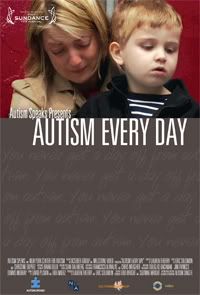 "He will never get married."
"He will never get married."
I'm sorry, but, who is to say this? The child she refers to is around kindergarten age. How can she predict this? I have seen videos of adult autistics from their childhood, and one may have predicted a grim future for them as well. Yet, they are doing SO much in their life. These parents promote the misconception that children with autism do not learn, grow, and change as they get older.
She speaks of seeing a mother dance with her son at a wedding, and how she'll never get to experience that. What parent can guarantee their son is going to get married? I know plenty of adult men and women who are not married, and a lot of them will tell you adamantly, they will never get married. So, what makes her think if her child was NT, that she'd get that dance?
Autism Everyday: Exploitations & Misconceptions (Part II)
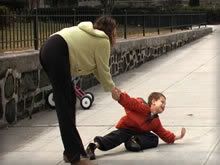 "The $50,000.00 that we're in debt...it's all about the autism"
"The $50,000.00 that we're in debt...it's all about the autism"
As far as I can tell, the child in this family is under the age of 5. I could be wrong. Either way, let's assume the child was diagnosed with autism around the age of 3. So, in two years or less, you have spent $50,000.00? On what? I'm rather curious as to what that money was spent on. The mother did discuss some special therapy room they built. Interesting, of all the many families I know who have autistic children, a very minute number of them have therapy rooms. The only ones who do, had plenty of money to do so. The rest of us, haven't felt a need for a "therapy" room in our home. Now, for quite a time, we transformed our kids' playroom into a sorta-therapy room. That is, when my daughter's ECI therapists came to the house, we put a few mats down, exercise ball, etc. and that's where her sessions were. Total cost was, I think...oh, right, nothing. Certainly, I would attend to a leaky roof--something that could be not only a safety but also a health hazard, before I went about creating a therapy room.
Aside from the therapy room, I'm still struggling to add the numbers up to $50K. They are in the U.S.A., and if I'm not mistaken, they reside in New York. New York is said to be one of the best states to live in, if your child is autistic (as far as schools, programs, etc.). I assume, if her child has so many issues, that he is getting therapy in addition to a special ed school program. Perhaps they do not have insurance, but then one would have to assume they receive coverage via medicare or medicaid, right? That's typically the way here. So, if they are doing private therapy in addition to what the school district is giving them, I would guess most of that is covered? I'm just trying to think of our healthcare coverage, what is covered, etc. and the experiences of our friends.
I still find it difficult to get to $50,000.00, that is, unless one was also using quack-cures. Perhaps that's where they are blowing their money and getting themselves into debt with? Huh...so it's not really the autism then is it? No, the $50,000.00 that you're in debt--it's all the insane autism fake-cures and biomed b.s. NOT the autism. Again, I may have missed some things here, and perhaps my math is a bit fuzzy, perhaps I'm too ignorant. But, the only way I can imagine getting ourselves into $50,000.00 debt in anyway related to autism is if I bought into the whole DAN!, TACA, etc. mindset, and allowed myself to get ripped off.
Autism Everyday: Exploitations & Misconceptions (Part I)
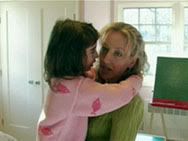 If you've ever read my blog, you probably know I'm not a big fan of Autism Speaks. But, in case you don't know, I take issue with the "Autism Everyday" video.
If you've ever read my blog, you probably know I'm not a big fan of Autism Speaks. But, in case you don't know, I take issue with the "Autism Everyday" video.
It disgusts me the way the children in this video are exploited. I am sick at how careless the filmmakers were and the message this video sends out. I've written previously about Alison Tepper Singer and how she was applauded for her bravery when she admits to contemplating killing her autistic child. That is by far my biggest grievance with the film. Here are some more...
The way the parents force their children to hug or kiss them. The effect of despair that comes from parents repeatedly saying "I love you" and not getting a response. It all comes off as very gut-wrenching. How bewildering it must be to be a parent to an autistic child, and never feel your love reciprocated. Guess what? My daughter can be very affectionate, at times and on her own terms. If a film crew, strangers with strange equipment were in our home, I highly doubt she'd feel much like hugging or kissing me. There is a chance she would cling to me for dear life; but I highly doubt we'd see the sweet and charming child I know her to be, in the calm safety of her home. No, with strangers here, following her every movement, she would have meltdown after meltdown, run and try to hide anywhere, it would be a nightmare for her.
I do not and will not ever force my child to hug or kiss me. For quite some time, the closest we would get to a hug, was an arm that would quickly wrap around our leg and then let go. That later turned into a brief half-hug near our back if we were sitting down. And now, we get full-fledged bear hugs! She will come up to us and squeeze us with all the love in the world! We are careful to ask her if we can get a hug, before we approach her. I am aware of her delicate sensory system. A hug at a certain time, and if she is unprepared for it, may not feel good to her.
Kisses often aren't something my child enjoys. You know what though? I can name you several alternatives to kisses, and they are all just as wonderful. We sometimes touch foreheads, chins, or noses to each other's. Recently, we've discovered our daughter is okay with "lipless" kisses. We press our lips against her cheek or forehead, and she smiles. She now says "no sound!" when she wants this type of kiss. If I forced her to hug on demand or kiss her with my lips puckered, she would pull away. What good would that do?
The majority of times that we say "I love you" to our daughter, we do not get a response. I've yet to cry over this. I won't ever cry over this. I realize that a lot of times, my daughter really doesn't hear us, especially if she is enthralled in an activity, television, etc. So, why would I get upset and take it personally? There's no reason, unless I wanted other parents, people with fat wallets, to feel bad for me and donate to my charity. Another discovery we made was that our daughter likes to sign "I love you." Even though she is verbal, and capable of uttering the words, "I love you," she prefers to sign it. It's a beautiful sight. I'll never demand she answer me when I say "I love you," nor will I want sympathy from others if she doesn't reply.
If these parents would simply throw out the criteria they have for what a sign of love is, be it a hug, kiss, or verbalization, they'd pity themselves much less. They need to quit taking it all so personally. Find alternatives. Meet your child somewhere in the middle, where he or she is comfortable. Doors will open, and I promise you, the new ways you discover to express love, will be even better than the "old" standbys.
1/14/08
My Little Fighter
When I first viewed the video I posted in the previous entry, it brought back so many memories of my daughter's infancy. I thought of how she never made eye-contact, something that actually troubled me when I would nurse her. She startled at every little thing, yet appeared deaf at other times. Dancing, making silly faces or noises, even clapping in front of her, and she would still have a blank stare. She held her body in odd postures. I had to remind myself not to take any of it personally. It sounds silly to say that, but no matter how level-minded one is, when your own baby doesn't respond to you, it can be heartbreaking. Most days, my daughter would prefer to sit in a swing, car seat, anywhere but in someone's arms. But, we continued to hold her and try out new ways that she felt more ease. We realized what she liked--swaddling. We swaddled her until 9-10 months old. I also discovered she preferred being held in a sling, instead of someone's arms. She also liked motion, I'd rock her, hold her while gently bouncing on an exercise ball, etc.
By around 8 months of age, I donated my "What To Expect The First Year" book as by then I could relate to very little of it. We watched our child, month after month, struggling to meet any of the usual milestones. So often, she seemed to be in her own world. All of those experiences, have made every gain that much more amazing. I remember how difficult it was for our daughter to roll over. She has what is now thought to be considered a typical "autism" roll. Every movement took so much out of her, so much effort. I remember her trying to crawl. For months on end, she would squirm a little while on her stomach and then just lay there. And then, one day, the squirming transformed into an army crawl meets fish flopping style movement. And with each day, she would move further and further. It took so much out of her, but day after day, she'd try again and again. She's been a fighter like this in every area of her life.
It honestly breaks my heart a little when I think about it. No child, no baby should have to work so hard and struggle so much for even the littlest of gains. I will never take any of my child's milestones for granted. When I think of how far she has come, and how from the moment she was brought into this world, she's had to fight, I know that forcing her into a certain mold (to be like everyone else), is simply not right. It would not be fair to put those expectations on her. That, over time, has come to me. I have accepted this completely. I no longer look to the charts as to what she should be doing or make comparisons. Sure, when I see NT children her age, the differences are evident, and my heart may pang for a second or so. That is natural, and I've learned to just feel that emotion and move on. That's simply the way it is.
Others will not be so fair or understanding toward my child. I do not know what she will be like at 15 or 25 or any age down the road. No one can say for sure what her abilities will be, what challenges or issues she will face, how independent she will be, etc. We will help her every step of the way, and feel strongly that if we advocate for her, she will be able to make a wonderful life for herself. But, I do realize there will be opposition. Other people will not be so accepting of her differences. We will work every day to hopefully change society's distorted view of autistics.
Christschool Video: Autism at 10 Weeks of Age
Another Great Video From Christschool...
I wanted to share this video, mostly for what is written in it. I agree wholeheartedly with what Christschool says here. His son is so adorable, and so it's also a sweet video to watch. I too am of the belief that autistic 3 year olds were also autistic 18 months olds, autistic 2 months olds, and autistic in the womb. At least, I should say, I feel 100% that my daughter has been autistic from the moment she was conceived. Every autistic individual has their own journey, their own traits. As a whole, scientists and doctors have summarized many common features that are a part of most autistics. But, it's important to remember, each person will have their very own unique experience. I do feel that a lot of regressions are simply autistic traits becoming more evident to parents.
At any rate, almost everything, from pregnancy to delivery and onward, with our second child was completely different than our first. I was extremely nauseas, lost weight until I was 5 months along with my second pregnancy. My youngest daughter moved, often erratically, in the womb. I even joked with my husband that she would pull an "Alien" (the movie) on us & pop out of my stomach. She was delivered, blue and not crying. She had issues from day one, some birth defects, many digestive issues, and developmental delays evident by 6 months of age. Had she not have the cumulative amount of issues, or the severity of each was less, perhaps doctors nor us parents would have been concerned until she was closer to 3 years of age. Certainly, had I not had my first child to gage various milestones, I would have been far less worried about my second.
I think this is something all parents must really understand and think about. I also like the comparison Christschool makes with this "phenomena" to that of eyewitnesses. I studied eyewitness testimonies in school, your mind tends to compensate and "make-up" details, often subconsciously. I think this happens a lot, unintentionally, with parents of autistic children. Despite everything going on with my daughter from Day One, I was very skeptical of an autism diagnosis. I remember during her evaluation, I told my husband that I thought she was making so much progress and doing so great, there's no way she'd get a diagnosis. He looked at me in such surprise, he even laughed. We had a long discussion, and I realized I was sugar-coating my daily reality with my child. Partly, the meltdowns, mood swings, and other behaviors were becoming typical, despite them being very atypical. The other part, was all the love I have for my child. It felt at times that speaking about all the negative things we were dealing with, was complaining about her or degrading her. I had to understand that we were discussing these things to help her. It was not a whine-fest or pity party, I had to look at this in a concrete manner. I almost had to remove myself from my emotions, and view what was going on in my child's life more as an outsider. I viewed several videos of my other child at that age. These perspectives, and my husband's reassurance, helped me greatly. I can understand how parents can unknowingly tweak their child's history, remember things inaccurately.
I think if parents can realize or admit that their child's autism is a part of them, not something separate, they will learn to accept their child, all of their child. Hopefully, they will then focus on ways of helping and accommodating their child, supporting them, and preparing for their child's future--with autism. Instead of pouring all their money into fake cures and dehumanizing treatments in hopes of getting rid of their child's autism, they may focus their attention on their child's life, and making the most of each day (again, autism and all!).
1/11/08
A Letter Worth Learning From...
Must be the day, I seem to keep coming across worthwhile stuff, from parents:
This is a great letter, from a parent to her autistic daughter's kindergarten teacher. It's helpful for other parents, full of ideas on how to help a child through their school day. It is inspiring because you can tell this mom cares about & believes in her child, and is willing to offer any help and support for her child. These are easy accommodations, and I think the general public could stand to learn a bit from this type of letter as well.
"Celebrating Autism" Article
"Celebrating Autism" article on Gather.com
I found this today & wanted to share. I LOVE when I come upon more parents who are celebrating their children. Also, great to hear some of the comments people left. It really gives me hope and it's great to see OUR word getting out. FINALLY!
1/10/08
If There Were A Cure...IAN Poll
IAN (Interactive Autism Network) recently put a poll on its website. As of the minute I write this post, here are the results:
Adults with ASD: If there were a cure, would you take it?
(total votes: 255)
| Yes |
| 8% |
| No |
| 81% |
| I'd wait and see what happened to others |
| 5% |
| Don't know |
| 4% |
Is it really shocking to any of us? Well, at least to any of us who ever spend anytime with adult autistics? And, once again, yes Jenny & Larry, they do exist! I've yet to meet an adult autistic who says they'd jump at the chance to be cured. The overriding thought is without autism, who am I? Autism is a deep-rooted part of an autistic, just as brown eyes are to me. Yes, they say, living with autism can be very difficult. But, along with the difficulties come great gifts. All of the adult autistics I know fear that if a cure existed, what would be lost along with the negative aspects of Autism? Who would they be?
I think all parents need to remember that. I think parents damage their children's self-esteem and self-worth when they speak of curing their child or ridding them of autism. I fear to think of what a child must feel when their parent constantly refers to autism about the evil thing, how much they hate it, how it really is an ass-kicking. Unfortunately, most of those same parents feel their child is lost, has been kidnapped, is without a soul, etc. They feel their "damaged" child is incapable of having feelings, either for themselves or others. If their child is nonverbal, they typically think he or she is closer to a zombie than a human being. So, how do we ever get through to these people? I do not know, but I hope I find the answer one day.
These same people will look at a poll like this, and completely disregard the results. They'll come up with some type of crazy conspiracy of who completed the poll and why it's a bunch of b.s. But, for those of us who see and treat autistics as people, due all the same civil and human rights as the rest of us, we will see the obvious truth in that 81%. In fact, I see it rising to even much higher than that. If you have doubts on this poll's results, go speak to adult autistics (on all areas of the spectrum). Get ready to have your eyes opened WIDE.
Katie Wright Speaks Out
Katie Wright on Autism Speaks' Grants
A new post on "Age of Autism" from Katie Wright that I stumbled upon. I found it somewhat interesting to hear what her views & feelings toward Autism Speaks. Nothing earth-shattering, she still hopes AS will start pushing the whole biomedical crap, blame vaccines, etc. etc. But, something that may be worth a read. I for one like to keep Autism Speaks, curebies, and others on my radar screen, you know how the saying goes "...keep your enemies closer."I can't help it, but I find some pleasure in this big divide that has formed (& is growing!) between the curebie-biomedical-mercury bunch and Autism Speaks. I find it so interesting that all these groups claim to want to "help" children with autism. Yet, together, they've done practically nothing to further the acceptance of autistics, assist teen and adult autistics with regard to career or vocational opportunities, living arrangements, independence, etc. They've done little to nothing to create solutions on changes in schools, the workplace, and in public that would benefit autistics. They have promoted the beliefs that autistics are missing a soul, hopeless, violent, and suffering. It appears that in the end, it will be TACA and Autism Speaks in the ring, fighting one another, parents on either side...and not a single autistic adult benefiting from the millions of dollars each organization blows through.
If you're interested in reading the article, click here.
1/9/08
The Latest No-Link Study
 Okay, yesterday's news & I meant to blog on then (but eyes are bloodshot & tearing up like crazy...hard to see!). Anyway...wonder what everyone will think of this study? Will they throw it out the window like others with similar findings? What will certain bloggers say--will they commit further to the fact that docs are pushing prenatal flu shots chock full of mercury in order to increase autism rates to deter from the vaccine-induced cases? Or, whatever insane theories some people have...
Okay, yesterday's news & I meant to blog on then (but eyes are bloodshot & tearing up like crazy...hard to see!). Anyway...wonder what everyone will think of this study? Will they throw it out the window like others with similar findings? What will certain bloggers say--will they commit further to the fact that docs are pushing prenatal flu shots chock full of mercury in order to increase autism rates to deter from the vaccine-induced cases? Or, whatever insane theories some people have...
A California study finds no link between the increase in autism diagnoses and thimerosal in vaccines. Follow link to read entire article, as featured on the Wired.com blog. Here are the first & last paragraphs, important highlights as I see it.
The CDDS data is considered a gold standard for autism epidemiology, and the study is more convincing than a CDC study published in September. It may be the most conclusive argument yet that thimerosal and autism are not strongly, or even moderately, connected.
The autism-thimerosal link appears, for public health purposes, to be dead. But rather than mocking the understandable anger of confused parents trying to grapple with early and imperfect science, critics ought to be grateful that vaccine carelessness didn't wreak havoc on the mental development of a generation.
Well said. Only time will tell, however, if this study has any impact...
1/7/08
CAICA & Hating Autism: What Is Going On Here???
UPDATE HERE: PLEASE READ!!!
The material has been REMOVED!!!
It was brought to my attention through the Autism Hub that the website for CAICA has several blog entries from the "Hating Autism" blog. I was honestly rather shocked that such an organization would post anything from this blog. The Coalition Against Institutionalized Child Abuse (CAICA) is a website I often refer to to spotlight the abuse that takes place everyday against children in institutions, hospitals, "treatment" centers, boot camps, etc. I have found it very helpful and informative. I was disappointed that they would actually print anything from a blog that often spews hatred, and furthers the type of stigmatization and discrimination against autistics. These beliefs are what leads to the abuse of children, the same children that CAICA is supposed to be fighting for.
The biggest issue here is that when you visit the page where this blogger's postings are listed, you have no clue who he is, what his experience is, etc. One may well think he is some sort of expert, and therefore take his information as fact. This is very dangerous. The page can be found here. It's troublesome to me that they kept the post's title of "Autism don't screw around," for their web page title. That is something else to ponder regarding CAICA and their views on Autism. Some of the more startling statements I came across on this page are here...
I believe the reason that the flu shot is pushed on pregnant women is because they need to cause more autism. Causing more autism when everyone is being told that the mercury is out of the vaccines is a great way to make the uninformed public agree that mercury could not have caused the epidemic. They have to cause more autism because, if autism suddenly disappears, it will help prove the case and the vaccine manufacturers stand to lose over a trillion dollars. The manufacturers don't have a trillion dollars which is why they have paid politicians to change the laws to prevent most parents of autistic children from filing lawsuits.A link to his blog (yes, with the title right there, "Hating Autism" for all to see) is on the bottom of the page. It is perplexing why CAICA made the decision to post this hateful, paranoid ramblings, plus a link with such a title. Seems very much against their Mission and Purpose Statements. I have written them, asking they remove the postings, and hope they find more alternative, accurate, informative, and positive material to have on their site. I really hope that if enough of us rally together, as was done with the Ransom Notes campaign, we will once again have success.
If anyone is reading this who knows someone whose child has not tried biomedical intervention, please ask them to read this. And, tell them to get in touch with Generation Rescue to learn how to save their child.It's easy for parents to get frustrated and give up. The only chance our children have is for parents to keep going to beat this son of a bitch named autism.
The object of any professional who works with autism should be to get rid of the autism. Settling for some half-assed improvement is far from professional in my book. Teachers need to learn that they can do their jobs a lot more effectively if the children they are teaching are receiving the medical treatment they need to remove the poison that caused the autism.
Please join me by contacting CAICA at info@caica.org. Thank you!
1/4/08
My Ransom Notes Letter...
I meant to post my letter last month...but we were all sick here and the holidays turned things upside down as usual. So, finally, here is what I sent to Dr. Harold S. Koplewicz at the NYU Child Study Center.
Dear Sir,
I am writing to voice my concern regarding the ransom note campaign that your Child Study Center will be running. I am the parent of an autistic child, and I myself have had to deal with depression, ADHD, & OCD. I do not think this campaign will be helpful to anyone. It does not help parents identify signs or symptoms, if a teen or child reads the signs it will surely make them feel more hopeless.
Furthermore, each ad stigmatizes the diseases and disorders. The themes of possession and kidnapping do nothing but spread the idea that those who suffer are inhuman. As a child and teenager who required fairly intense medical intervention to overcome some serious issues, I know how society judges and treats the mentally ill and the disabled. The public doesn't understand. Ads like this push the public into further misunderstanding, and promote stereotypes. It was my understanding the goal of this campaign was to spread awareness and end the stigma surrounding these conditions. I feel this campaign is doing just the opposite.
As an artist, I do see the attractiveness and creative angle of these ads. They are also eye-catching and thought-provoking. Unfortunately, they lack accurate and helpful information. They tend to be more of an ad to promote fear and hopelessness. I sincerely hope you will reconsider these ad campaigns, and further ads will be of a kinder, more accurate, and more helpful nature.
I wish I'd had the time to post a celebratory post a few weeks ago when this all came down...I'm thrilled to see the great change we all created. It surely has refueled me, and also made me feel like real change can happen. I think more & more voices are being heard each day, and while we have long road ahead, it is more possible than ever for us to achieve all we are fighting for. I am filled with hope for the New Year.
Happy New Years!
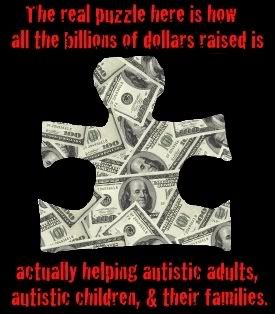





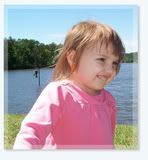

 This Way of Life
This Way of Life

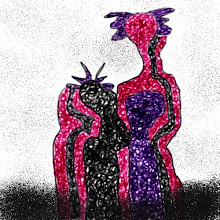

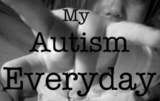





 "Autism is a way of being. It is pervasive; it colors every experience, every sensation, perception, thought, emotion, and encounter, every aspect of existence. It is not possible to separate the autism from the person."
- Jim Sinclair
"Autism is a way of being. It is pervasive; it colors every experience, every sensation, perception, thought, emotion, and encounter, every aspect of existence. It is not possible to separate the autism from the person."
- Jim Sinclair


